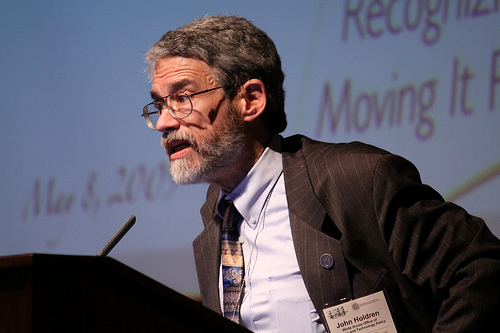
Photo by The National Academy of Sciences, <a href="http://www.flickr.com/photos/nationalacademyofsciences/3522799888/">via Flickr</a>.
One of President Barack Obama’s first executive orders last year was a demand for improved scientific integrity across federal agencies. His administration, he said, was devoted to “ensuring that scientific data is never distorted or concealed to serve a political agenda, and that we make scientific decisions based on facts, not ideology.” He directed John Holdren, his chief science adviser, to “develop a strategy for restoring scientific integrity to government decision making” and ensure that the new administration makes decisions based on “the soundest science.”
It was a directive to repair the tattered image of government science following eight years of the Bush Administration, during which scientists were silenced, reports were supressed or edited, and administration officials refused to even review key scientific findings. And that’s just referring to climate science–there was also plenty of evidence that they sought to undermine or ignore scientific findings in food safety, air pollution, and reproductive health.
The Obama administration’s plan to restore credibility to the agencies was due by July. But one year after the order, we still haven’t seen guidelines from the Office of Science and Technology Policy (OSTP). Now scientific integrity advocates are wondering what’s taking so long. “While the new administration has been generally supportive of scientific integrity values, it’s moving too slowly to establish badly needed reforms,” says Francesca Grifo, director of the scientific integrity program at the Union of Concerned Scientists.
UCS notes several key steps the administration should take. The current system, says Grifo, “still discourages scientists from communicating about their research results” and “keeps the public in the dark about the scientific basis for policy decisions.” She says that while NASA and the National Oceanic and Atmospheric Administration have adopted better policies about talking to the media, other agencies have not. She’d also like to see more openness about who administration officials are meeting with. The White House last year began releasing visitor logs, but other agencies aren’t required to do so.
There also aren’t strong enough protections for government scientists who blow the whistle on malfeasance, says Grifo. She pointed to recent testimony before the House Oversight and Government Reform Committee from Dean Wyatt, a former official at the Food and Drug Administration, on the agency’s retaliation against him for reporting serious problems at two meat packing plants in 2007 and 2008. “The administration has changed, but the system that allows retaliation against whistleblowers has not,” says Grifo.
The House Science Committee put Holdren on the hot seat on the issue last month. Most of the attacks were from Republicans arguing that this administration is stifling climate science–something they didn’t seem to have much of a problem with in the previous administration. So the new rules would ideally shield the administration from criticisms Republicans are now lobbing their way.
At the hearing, Holdren acknowledged that the delay was “appalling,” and cited “the difficulties of constructing a set of guidelines that would be applicable to all agencies and accepted by all concerned.” Rick Weiss, director of communications and a senior policy analyst at OSTP, says the plan should be finalized in the near future. “Although it is close to being done, it is not done yet,” he tells Mother Jones, adding that the plan is still caught up in discussions between the agencies, the Office of Management and Budget, and OSTP.
While scientific integrity advocates are getting impatient about the new guidelines, they acknowledge that much has improved in just the first year under Obama. Admittedly, the Bush administration set that bar pretty low. But formal new rules would go a long way to restoring the lost credibility of government scientists and agencies.













